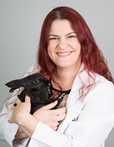Veterinarian Talia Gattenuo of Lone Mountain Animal Hospital in North West Las Vegas explains the causes and symptoms of parvovirus.
Preventable, yet potentially fatal!
You always hear your veterinarian talking about different illnesses that are preventable, but do you know what these viruses can do to your pet? Parvovirus is one of the most common, sometimes fatal virus that falls into the 100% preventable category.
Parvovirus is a life threatening and often-fatal illness. Once inside the body, the virus targets bone marrow, intestinal cells, fetal cells, and the cells of the lymph system. This virus is so resilient that it can survive freezing temperatures and is resistant to many household cleaners.

parvoviral infection can be picked up ANYWHERE
Parvovirus is extremely contagious..
and enters the body through the mouth. It spreads through contact with stool or saliva from an infected dog. Infected dogs release huge amounts of virus in their stool causing environmental contamination. The virus is durable in the environment because of its genetic makeup, it can be carried on surfaces like shoes, clothing or carpet, and spread rapidly. Parvo is considered universal, meaning that it is present in every environment that is not regularly disinfected and can be transferred by any person, animal, or object that encounters infected feces.
Newborn puppies don’t make antibodies (proteins that fight infection) so they have no protection against the infection. The Parvo virus incubates in the body for 3-7 days before the puppy appears to be ill. Symptoms of parvovirus include extreme lethargy, vomiting, loss of appetite and diarrhea. The vomiting and diarrhea cause extreme dehydration and lead to death. This is not an illness that only affects puppies, adult dogs that are not vaccinated against parvo can contract the virus as well.
Dogs have an 80% parvo survival rate if hospitalized with early diagnosis. That figure drops to 10% survival rate without veterinary care. Home treatment for parvo is not ideal in comparison to hospitalization as veterinarians have more emergency care tools at their disposal including IV fluids and injectable medications not to mention round the clock professional care for your pet.

Adult dogs who have not been fully vaccinated can contract Parvovirus
What can you do to protect your pet against the parvovirus, VACCINATE! Vaccination is a four-part series for a puppy given at six, eight, twelve and sixteen weeks. It is recommended that owners keep puppies indoors, off the floor at their veterinarian’s office and reduced socialization until their vaccination series is fully complete. Realize that partial vaccination is not enough to ensure that your pet is protected.
It is our hope that pet owners understand the importance of a fully completed vaccine series in relation to their pet’s continued overall wellness.
Photo source* Unsplash.com






